#functionally dysfunctional
Explore tagged Tumblr posts
Text
yay water
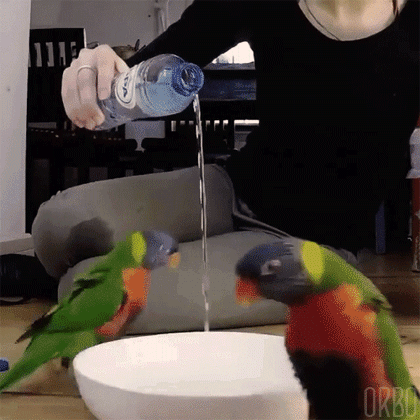
time to drink water woo hoo yay
#drink water#hydration#stay hydrated#water reminder#self care#self care tips#autistic self care#adhd self care#audhd struggles#audhd problems#audhd creature#adhd autistic#poor interoception#interoception#adhd help#autistic community#adhd community#prompting#functionality#executive dysfunction#adhd experience#autistic experiences#instrumental activities of daily living#activities of daily living#adls#iadls#did osdd#neurodiversity#time blindness#autistic borderline
44K notes
·
View notes
Text
Workbooks to improve executive functioning
Since the post I made last night about improving executive functioning was so popular, I figured I should pull these out of my comments and give them their own post, in case it's helpful for people.
I have worked with the publishers of all of the books linked below and can vouch for their psychology books. The publisher of most of them, New Harbinger, is an extremely credible evidence-based psychology publisher.
Obvious disclaimer that everyone's brain is different and what works for someone else may not work for you.
Is there evidence that executive functioning can be improved? Yes. This book appears to be a very thorough overview of the field, and contains both advocates and detractors of cognitive training, for a balanced perspective. From the table of contents, I would really recommend jumping straight to Part 3: Developmental Perspectives for executive functioning (EF) writ large.
Certain therapy modalities are specifically designed for skill-building in areas like impulsivity, decision-making, emotional regulation, and cognitive flexibility, all of which are EF skills or very dependent on EF skills. Dialectical Behavior Therapy (DBT) is probably the best field to look at for these - skill-building in those areas is its core goal.
Some DBT workbooks:
The Dialectical Behavior Therapy Skills Workbook: Practical DBT Exercises for Learning Mindfulness, Interpersonal Effectiveness, Emotion Regulation, and Distress Tolerance
The Dialectical Behavior Therapy Skills Workbook for Teens
There are also a lot of workbooks for ADHD that are sometimes more broad but also can help with executive functioning:
The Adult ADHD and Anxiety Workbook: Cognitive Behavioral Therapy Skills to Manage Stress, Find Focus, and Reclaim Your Life
The CBT Workbook for Adult ADHD: Evidence-Based Exercises to Improve Your Focus, Productivity, and Wellbeing
The Neurodivergence Skills Workbook for Autism and ADHD
General executive functioning workbooks:
The Executive Functioning Workbook for Teens
Executive Functioning Workbook for Adults: Exercises to Help You Get Organized, Stay Focused, and Achieve Your Goals
Hope these are helpful to someone!!
#executive dysfunction#executive function#adhd#autism#actually autistic#neurodivergent#advice#adulting
6K notes
·
View notes
Text
The fact of why all the batkids are like that can be easily explained by their sibling status. Most of them were only children for a big chunk of their lives, and then got turned into middle kids in the span of roughly 4 years.
Dick is obviously an exception but hes the eldest so that carries its own issues. My guy was an only child til 19 and then in the span of 8 (ish?) years he had like 5 to 8 younger siblings. No wonder he's a moment away from losing it at all times.
Jason was an only child til 12, then a younger sibling (barely, Dick was never home and didn't really talk to him, I'm counting that as only child time too) and then when he came back, he had like 3 new younger siblings and a suddenly very involved older brother. The whole under the red hood business? Middle child behaviour.
Tim was an independent only child til 13, a younger brother for like 3 years max (time is wonky here cus dc won't let him age) and then a chaotic middle child with a vendetta at 17. Of course he just does what he wants, no one ever fucking stopped him BEFORE.
Duke had the unfortunate luck to go from 15 years of only child treatment to immediately being a middle. I would cry.
Same with Cass. Only till 17, then immediately middle.
The other exception is Damian who was treated as a prince and the only heir to the demon throne for 10 years and then suddenly he was sent off to bumfuck New Jersey, to a house of disfunction. I personally love the hc that Jason was like a brother to him back at the league, so he's either like that cus he was an only child and then a youngest OR he was always the youngest. Both options explain A LOT.
I'm including Steph even if she's not strictly in the family. Imagine you're an only child for 16 years, you start dating a guy with the most dysfunctional family you have ever seen, they try to indoctrinate you, you resist, but now you kinda have 8 siblings against your will.
Also Barbara. Girly dated a guy, and depending on the comic she either stayed in the family business permanently or broke up w the guy and STILL stayed permanently. Icon. I do think she is more like a cousin who knows too much about the family drama to not be part of it, but still.
#chaos ramblings#the most dysfunctional family to ever function#batfam#batfamily#dysfunctional family#complicated family dynamics#dick grayson#jason todd#tim drake#damian wayne#stephanie brown#cassandra cain#barbara gordon#im gonna tag this#batfam headcanons#but as far as i know this is canon#feel free to correct me
281 notes
·
View notes
Text
i don't know who needs to hear this but do not listen to the voice in your head telling you you don't need to prepare tomorrow's breakfast or pick out tomorrow's outfit tonight. don't listen when it tells you you'll have time to do that tomorrow morning. that is the voice of the devil talking. do not listen.
#your future self will thank you. trust me#advice#life advice#procrastination#adhd#executive dysfunction#autism#actuallyautistic#by the devil i mean executive dysfunction#can anybody tell i'm not a morning person#salty tries to function with both adhd and autism.post
879 notes
·
View notes
Text

shoutout to agent stone for being the prettiest man alive
#i was supposed to be working on my school work#but oh well#um. um. yeah. whatever.#my ipad is almost dead again omfg#k im gonna go pretend to do work now - is gonna go read fanfics#my art#stobotnik#idk what to tag this#dr robotnik#agent stone#(btw i really like stones fandom name ive seen on ao3. aban is such a pretty name)#(its canon to me)#also fun fact i couldnt care less about sonic im here just for these two.#as ive said before: theyre like the most dysfunctional functional qpr ever#k i should go sleep actually
969 notes
·
View notes
Text

#autism#autistic#actually autistic#affirmations#autism memes#autism affirmation#adhd#audhd#adhd memes#executive dysfunction#executive function
1K notes
·
View notes
Text
all i want from the next episode of leverage redemption is for parker and astrid’s conflict to be played as though it’s a ridiculously intense sibling rivalry. not the whole episode, clearly it’s gonna get a lot more dramatic, but just a couple of comedic moments where parker is seething at having to share her mother figure with her kind-of-ex-nemesis. parker has gotten a little used to being mom’s (sophie’s) favorite child through the years and she does NOT want a new interpol agent sister.
#leverageposting#leverage#parker leverage#astrid pickford#leverage redemption#parker#leverage redemption spoilers#lr3 spoilers#lr spoilers#leverage redemption s3#we know parker got jealous when another girl was interested in hardison so i don’t think it’s too much of a stretch to think that’d apply to#platonic relationships to some extent too. specifically bc sophie is a mother figure to parker as well as a friend/mentor/coworker.#i love sophie and parker’s very weird dysfunctional mother daughter esque relationship.#well it’s a lot more functional these days (as opposed to early og leverage) but still v funny and sweet now.#but i think sophie reconnecting w astrid might bring up some Feelings for parker considering… *gestures to parker’s whole childhood*
218 notes
·
View notes
Text
I had this video idea and felt like tumblr would appreciated a lot more than tiktok, so here you go. Do things the easy way.
201 notes
·
View notes
Text


I’ve never met context. Seems like a fun guy
#KNOX ART (me)#Sonic the Hedgehog#....i really gotta figure out what to tag this as#gotta come up with an au name or somethinnnnn#i was gonna draw more of this but i got home had to clean and what i assume was exacutive dysfunction kicked me in the teeth#but pssshaaaw no way its really that see im a functional person <-lies#anyway#shadow the hedgehog#or wait i guess its#satbk sir lancelot#Knave the Hedgehog#so true so true-#drew half of this in the car and was incredibly carsick by the time i finished#anyway yeah my brain is so fried now im running on empty and ive got math beating me up tomorrow so gngn
349 notes
·
View notes
Text
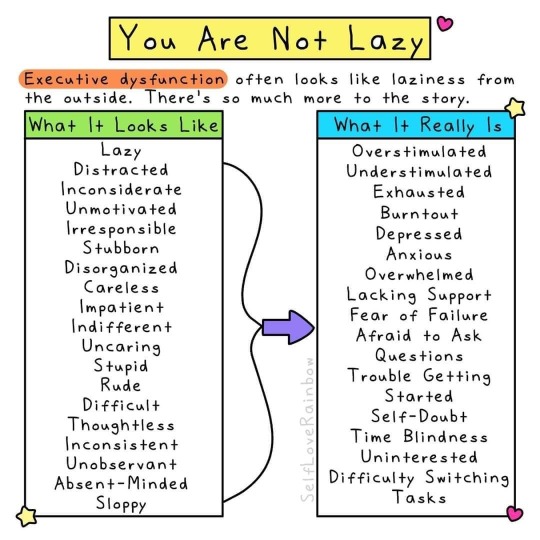
You Are Not Lazy
Executive dysfunction often looks like laziness from the outside. There's so much more to the story.
What It Looks Like: What It Really Is:
Lazy — Overstimulated
Distracted — Understimulated
Inconsiderate — Exhausted
Unmotivated. — Burntout
Irresponsible — Depressed
Stubborn — Anxious
Disorganized — Overwhelmed
Careless — Lacking Support
Impatient — Fear of Failure
Indifferent — Afraid to Ask Questions
Uncaring — Questions
Stupid — Trouble Getting Started
Rude — Uninterested
Thoughtless — Time Blindness
Inconsistent — Time Blindness
Unobservant — Uninterested
Absent Minded — Difficulty Switching Tasks
Self Love Rainbow
#neurodivergence#neurodiversity#actually neurodivergent#executive functioning#executive dysfunction#what it really is#feel free to share and reblog#Self Love Rainbow (Facebook)
2K notes
·
View notes
Text
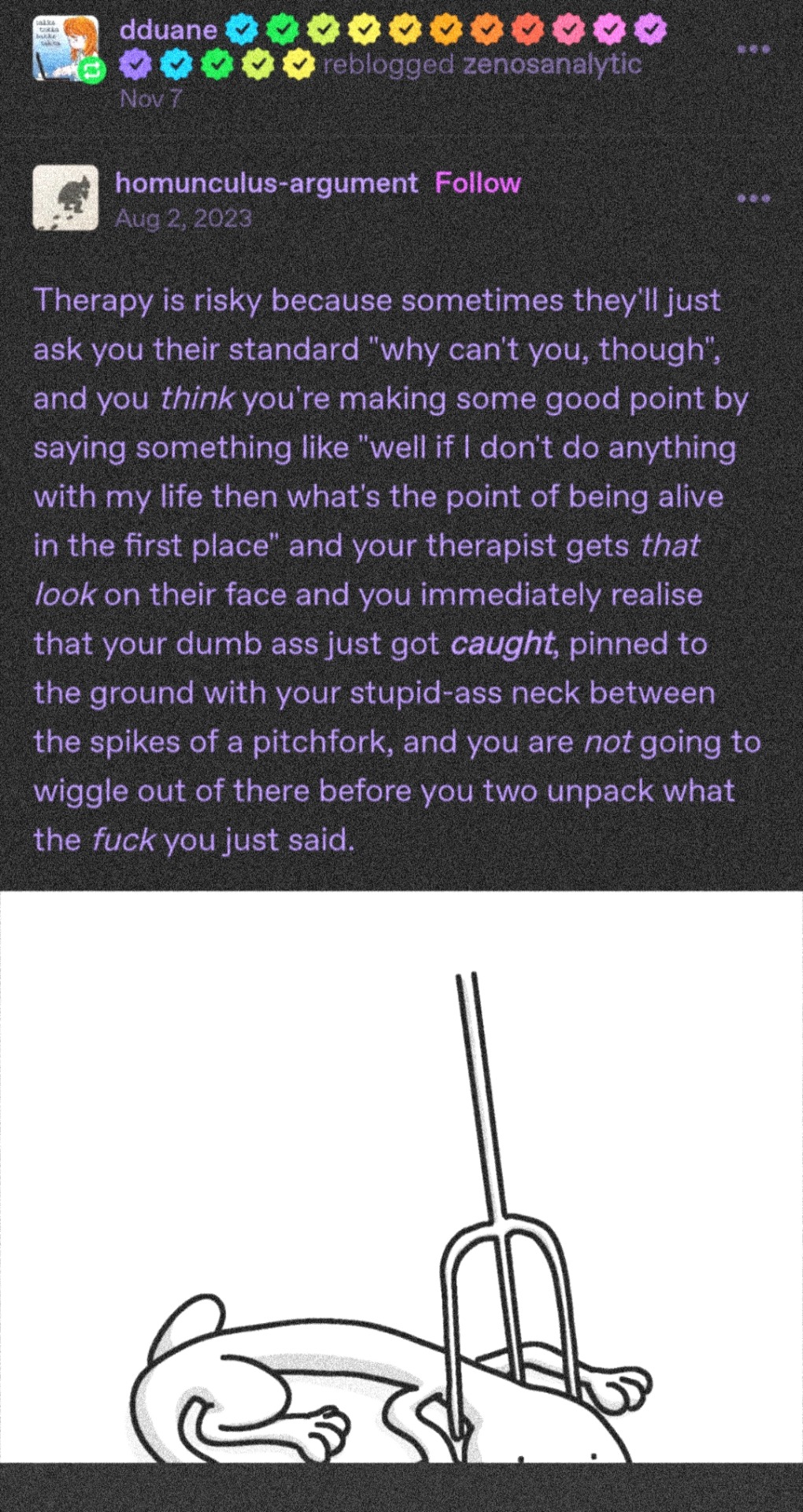
I didn't want to reblog this actual thread because my sidetracking doesn't need to be on a good and helpful mental health post. BUT. I wanted to ask anyone who has noticed the same thing I have about this topic: why do you think this kind of therapy does not work on the very large percentage of autistic people that it does not work on, including myself. many professionals and laymen have tried this tried-and-true method of subverting depression on me and I will just argue back, and I will have more reasoned arguments than they will. and I will engage with their question ("why do you feel that way") and the proceeding argument in good faith, but the therapist will not be prepared to advance past the professional Jedi mind trick of just telling me my extremely studied reasons for thinking a certain way aren't rational and should simply be abandoned. they don't have any more rabbits in the hat after that. so what the fuck
#i mean i know why#its because my thinking isnt dysfunctional or irrational its actually extremely realistic#but realism gets you depression in this cultural context#the only functional mood mindset is unsupported optimism and naivete#i ask therapists about this too and none of them have ever been able to answer me#i mean i have thirty answers to the rhetorical question in the OP ready to go#i will “win” the argument because the therapist's side is like “existence is its own reward :)” or some shit#and also i need to pay rent and eat so...
177 notes
·
View notes
Text
Me, laying in bed at seven o’clock: In the grand scheme of things, does spending $100 on yarn really matter?
#haven’t done it. don’t want to. need the yarn#I’ve been feeling very un-functional lately#not quite dysfunctional but like I’m heading there
126 notes
·
View notes
Note
“familial affection, guilt, and extreme possessiveness” - that RULES. Shen jiu is such a shaken bag of cats, anything he feels will be expressed in a new and disastrous way. I have to say, i missed the extreme possessiveness given him giving up her body so easily—how does this possessiveness end up manifesting in him? And the other feelings? Loving this au, thanks so much for letting us pick your brain!
Shen Jiu's possessiveness takes different forms with different people. With QHT!Shen Yuan, he acknowledges the fact that "she" doesn't want to belong to him; and when she chooses Luo Binghe in death, Shen Jiu accepts her decision and decides not to recover her body from him. While she was alive, his possessiveness generally manifested as aggression towards fellow disciples who showed interest in her--he knew that Shen Yuan never returned their interest, so he took immense pleasure in "punishing" their unwanted advances until they backed off. (Shen Yuan was never aware of this, though Yue Qingyuan was.)
The guilt usually comes out as acquiescence to her wishes, and the familial affection as a desire for company and conversation (which he no longer receives, unless he and Shen Yuan are fighting about something).
Conversely, some part of Shen Jiu believes that he owns Yue Qingyuan, regardless of the latter's wishes. This is why he keeps Shen Yuan after Yue Qingyuan's death in my fic Phoenix Chick in the Cuckoo's Nest--he was functionally banned from visiting YQY's grave, so he takes Shen Yuan (Yue Qingyuan's son) in place of a piece of Yue Qingyuan's physical body; he would gladly have kept one of YQY's bones if he had the chance to do so.
#svsss#qiu haitang shen yuan au#the thing about sj's attitude towards qhtsy is that it's actually quite....respectful?#he's never once tried to force her to do anything#or commented on the choices she makes#except once: when he tried to drag her away from lbh when he was qi deviating#sy immediately showed sj what he thought of that by ripping his hand out of sj's and going to binghe regardless#and then promptly dying 5 seconds later#yqy on the other hand......that's a very different story#their relationship during the years sy is dead is both oddly functional and *extremely* dysfunctional because of this#asks
65 notes
·
View notes
Text
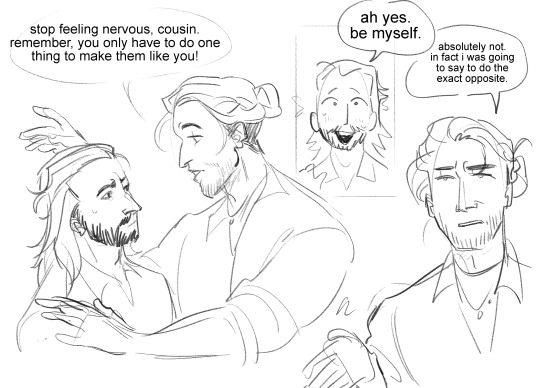


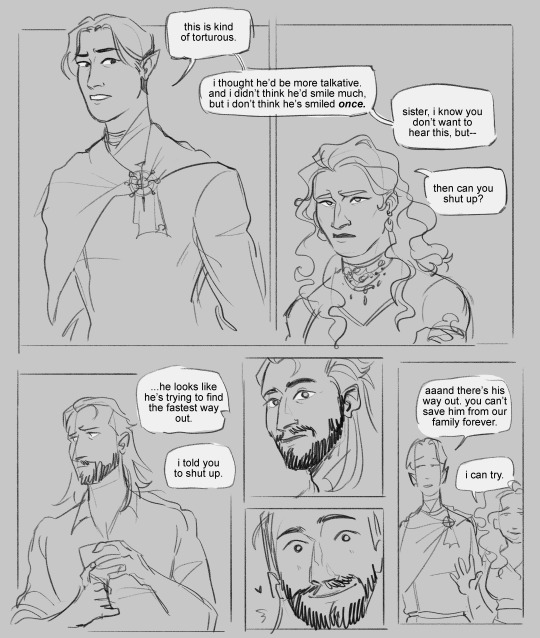
the meet the family epilogue drawings continue ft. the laidirs
#now you may mistake these drawings as being cute and funny#but this entire thing is only disguised as a romcom because tyche and lucanis at this point are like#genuinely moments from breaking up and giving up on the long distance thing. LOL#its very much tyche trying to see if lucanis can function in her life and if she can pry him away from being talon#and if he can function without dellamorte style dysfunction. this happened to my friend carmy berzatto#my art#lucanis dellamorte#tyche laidir#rookanis
50 notes
·
View notes
Text
my executive function model
I've heard the term "executive dysfunction" thrown quite a lot online, but I couldn't really pinpoint what exactly it means. I decided I first need to understand what executive function is first in order to make sense of it.
After some research (not a lot so take it with a big grain of salt) and self-reflection I developed an executive function model to better understand where I struggle and where I excel.
I identified 8 executive functions, split into primary and secondary, and defined how they interact with each other.
I created a diagram that illustrates and summarizes this model, kind of a tldr. The information from the diagram is described in the text in this post though. At the end of the post is an example of how this model applies to me specificaly.

core executive functions
Those I kept the same as in the research I did, as they seem to be more widely agreed upon.
Inhibitory control - suppressing inappropriate behavior, resisting distractions and urges, emotional control
Working memory - holding, recalling, and manipulating information, mental juggling
Cognitive flexibility - switching tasks, shifting attention, tolerating change, letting go of stuck thoughts
secondary executive functions
Those are more adjusted to fit my personal experience, and are in the sequence it which I personaly engage in activities.
Strategic analysis - understanding the problem, reasoning, generating solutions, predicting outcomes; you need to analyze the problem and generate what can be done about it
Decision-making - balancing risk, reward, and long-term outcomes, deciding on course of action; you need to then compare and decide on one of the courses of action from the generated ones
Planning and organization - planning, organizing, breaking tasks into steps, time estimation, prioritizing; once you know what you want to do, you have to plan the actual actionable steps of it, place when you will do them, in what sequence
Action initiation - getting started on tasks, overcoming inertia, avoiding procrastination; you actually need to follow through the plan, go and do the thing you planned
Self-monitoring - monitoring progress, noticing when you're off-task or overwhelmed, error detection, adjusting behavior, self-assessment; once doing the thing, you need to monitor yourself on how you're doing on the task but also notice if something else hasn't become more important
how they interact
The primary executive functions support the secondary, they are like building blocks of them:
1. Inhibitory control
Strategic analysis: prevents rushing to conclusions; allows pause and reflection before jumping to solutions
Decision-making: suppresses impulsive or emotionally-driven choices; supports delay of gratification
Planning and organization: helps avoid distractions when building plans and ignore irrelevant details
Action initiation: inhibits avoidance behaviors or urges to delay ("I’ll do it later")
Self-monitoring: suppresses defensive reactions to noticing errors; allows recalibration
2. Working memory
Strategic analysis: holds problem details, relevant knowledge, and potential solutions in mental space
Decision-making: maintains multiple options, their pros/cons, and predicted outcomes to compare
Planning and organization: tracks task steps, sequences, and dependencies during mental planning.
Action initiation: remembers what the task is and how to begin — even after delays or distractions
Self-monitoring: holds the original goal or plan in mind while checking current performance against it.
3. Cognitive flexibility
Strategic analysis: allows consideration of alternative problem framings or novel solutions
Decision-making: enables reevaluation of options and openness to changing course
Planning and organization: helps adjust plans dynamically if priorities shift or obstacles arise
Action initiation: Supports shifting mental state from rest to task-engaged mode
Self-monitoring: helps switch strategies mid-task, revise expectations, or tolerate outcomes that don’t go as expected
my personal application
Firstly, out of the three core executive functions my weakest one is working memory. I am quite good at the other two though.
Going off that profile of my primary executive functions, I perform as below in the secondary executive functions:
Strategic analysis - I excel at it. My high cognitive flexibility allows me to see a lot of options, and inhibition allows me to focus on analysing a problem for a long time. I compensate for my low working memory by writing things down, visualizing them etc.
Decision-making - I am rather bad at it. After I analyse the problem to its smallest components and generate lots of ideas in the first step, there are a lot of details to keep in mind when comparing them, and this is where my poor working memory struggles. I also have problems with confidence in my decisions, since I can so clearly see so many options possible and their consequences after my analysis.
Planning and organization - another area I am good at, because I can write things down or draw them out thus compensating for my bad working memory. Inhibition allows me to be realistic with my plan, and cognitive flexibility allows me to adapt it to the actual needs.
Action initiation - a real bottleneck in my process. At this stage I usually have so many details I can be easily overwhelmend with my poor working memory. Also it involves deciding to do the thing, and we already know I struggle with decisions. My high inhibition may also cause a lot of hesitation here.
Self-monitoring - I am moderately good at it. I can struggle with keeping the original goal of the task in mind because of poor working memory, but can manage if it's cleary defined and written down. High congnitive flexibility allows me to adjust my actions according to the performance, and inhibition allows me to avoid distractions and reflect without becoming emotional.
As you can see from this picture, I clearly can benefit the most from using various visual aids and allowing myself to "think on paper" rather than forcing myself to hold everything in my brain. I just seem to have small RAM, but my processor is quite strong.
#schcomtalk#executive function#executive dysfunction#actually autistic#neurodivergent#neurodiversity#autism
68 notes
·
View notes
Text
It’s almost like severely shaming people who struggle with self hygiene because of mental illness or sensory issues isn’t going to make it easier for them to do those things. Fuckssake.
#self care is hard#self hygiene is hard#autism#mental health#mental illness#executive function#executive dysfunction#body focused repetitive behavior#disability#disabled
64 notes
·
View notes